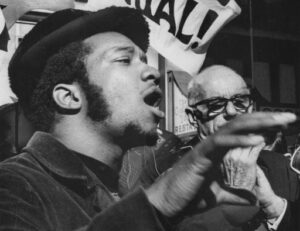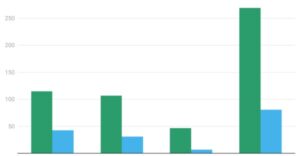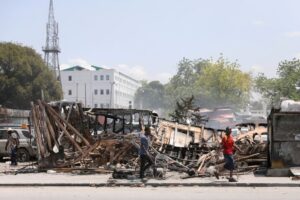The recent elections in Latin America of a series of center-left or “progressive” governments is a welcome change for the region. But many North American observers have looked at these governments uncritically or with rose-colored glasses. Typical of these kinds of analyses are Jacobin’s headline that “Latin America’s Second Wave of Left-Wing Governments Could Be More Powerful Than the First” (the actual article isn’t as definitive on this point) and CODEPINK co-founder Medea Benjamin’s claim that Mexican President Andrés Manuel López Obradorhas become “a leading progressive figure in the Americas.”
The radical Uruguayan journalist and chronicler of Latin American social movements Raúl Zibechi is much less enthusiastic about new progressive governments. In the article below, Zibechi points out the real constraints, both external and self-imposed, that these governments will face. This article,published originally in the radical magazine El Salto, based in the Spanish state, was republished in Correspondencia dePrensa. The ISP translated it to English.
On some occasions, an electoral result masks political reality instead of clarifying it. Detached from the environment and the existing relationship of forces, it can confuse those who observe it from a distance. With the passage of time, when the deep currents of society do their inexorable work, the possibilities of change will have been diminished and even blocked.
In the analysis of recent progressive electoral victories, observers often miss that they came to power without parliamentary majorities, in deeply divided societies, where the right wing has been strengthened to the point of being able to veto change. And let’s not forget two additional facts: that global markets play against the slightest modification of the rules of the game and that these progressive forces often have neither the will nor the adequate program to change the reality they inherit.
Since 2018, there have been in Latin America six victories of leftist and progressive presidents and their coalitions: Andrés Manuel López Obrador (known as AMLO) in México, followed by Alberto Fernández in Argentina, Luis Arce in Bolivia, Pedro Castillo in Perú and, just in this year, Xiomara Castro in Honduras, Gabriel Boric in Chile, and Gustavo Petro in Colombia.
Although each case is different—the second iteration of progressive government in Argentina and Bolivia contrasts sharply with the first—there are social forces that cross all of these developments, limiting the possibilities of deep transformation and the scope that this second progressive wave may have.
To get a better understanding of the processes underway, we should contrast them with the climate and context of the victories that took place between 1999 and 2005 in Venezuela, Argentina, Brazil, Uruguay, Ecuador and Bolivia. To a large extent, these governments were the product of a cycle of intense popular struggle that disrupted neoliberal governments focused on privatization of state-owned enterprises. In many cases, there was a direct relationship between street fighting and the victory of the progressive governments. Except in Colombia, that is clearly not happening today.
The first limitation is the global crisis and globalization, as well as the ongoing civilizational crisis. The growing confrontation between the U.S./EU with Russia and China, forms a complex scenario where progressive governments do not seem to feel comfortable.
Beyond some exceptional situations, such as the erratic presidency of Pedro Castillo, the new progressive governments will have to operate within a new reality that has some common characteristics that constitute the main limitations on the new governments. Without discounting each government’s internal weaknesses and contradictions, or the vague or systemic decisions they are making, we must address the global situation before moving on to other factors.
The global crisis
The first constraint is the global crisis and globalization, as well as the ongoing civilizational crisis. The growing confrontation between the U.S. and the European Union with Russia and China provides the backdrop that leaves progressive governments uneasy. For example, the president of Honduras, Xiomara Castro, reversed her campaign promise to establish relations with the People’s Republic of China to maintain them with Taiwan.
In a similar vein, AMLO defends the integration of America—not Latin America—stressing that this is the way to challenge China (Milenio, June 9, 2022). At the same time, he protested the U.S.-driven exclusion of Venezuela, Cuba and Nicaragua from the recent Summit of the Americas.
This balancing act is commonplace today. Chile’s Boric criticizes Venezuela and Nicaragua head-on. Even [Colombian president-elect] Petro, who supports the reestablishment of diplomatic relations with Caracas, announced that he does not think it “prudent”for [Venezuelan President] Nicolás Maduro to attend his inauguration on August 7.
It is impossible to hide the fact that there is a deep division on the central issues of international relations—on the invasion of Ukraine, the role of China and the United States. Above all, the current progressive governments’ hesitation and fear of provoking friction with Washington makes them a prisoner of contradictions that apparently paralyze them.
The region’s governments need to trade with China, since it is usually their main trading partner. But they (apart from Venezuela, Nicaragua and Bolivia) continue to look to the United States as a reference point with which they do not want to have problems. On the one hand, Washington’s blockade against Caracas—with its tremendous economic consequences—may be working to discipline the progressive governments. On the other hand, the progressive government teams seem to be disoriented in the face of the seriousness of the global crisis, which they have not been able to anticipate or to respond on the national level.
On this point, a clear distinction should be made between South America, which has a close trading relationship with China, and Central America and México, which continue to lean towards the United States. The case of México is the most disconcerting. Lopez Obrador makes verbal criticisms, but is firmly aligned with his northern neighbor, both in the repression of migrants and in their relations with China.
The new right
The second problem facing the new progressive wave is the growth and mobilization of the new right. With the relative exception of México, a new right is emerging in the rest of the countries. It has no qualms about portraying itself as racist and anti-feminist, rhetorically denigrating women, abortion, equal marriage, and sexual minorities.
For a long time, the left, trade unions and popular movements had a monopoly on streets and squares. But since the 2008 crisis, the right has maintained a constant presence on the streets. This happened in Brazil, and at particularly important junctures, in Argentina, Chile, Perú, and now Ecuador, as well. This right-wing street presence not only limits progressive and leftist forces, but often demoralizes and demobilizes them.
This new right sets itself against the prominent role that women, LGTBQ people, Indigenous people and Blacks playin their societies. It sees this as a threat to the historically privileged position that urban white middle-class minorities have occupied. For the right, Colombia and Brazil have been the big successes. In the first case, the impact of this right wing translated into the victory of the “No” vote on the 2016national plebiscite called to approve peace agreements between the government and the FARC guerrillas. In the second, we can see this in the massive support for Brazilian president Jair Bolsonaro. A confused and disoriented Brazilian society allowed this unscrupulous character to ascend to the presidency.
These new rightists have woven alliances with the evangelical churches that have a strong presence in working-class and poor neighborhoods. But they have also allied with the military, the police and paramilitary groups that share their visceral hatred for the left and for civil rights. In this web of interests, we can’t disregard the role of drug trafficking and other illegal businesses in this configuration of political forces that disdain democratic values, but also have broad social support.
The militarization of society
A third limitation, which also did not affect the first progressive wave, is the growing militarization of our societies. This is a process that has been intensifying since the global crisis of 2008. It crosses all countries in different ways, according to their histories and the levels of racism and machismo present in each of them. With Latin America being the most unequal continent in the world, the intervention of the armed forces and police to control the population aims to lock those conditions in place.
Despite AMLO’s controversial creation of the National Guard, led by the armed forces, violence has not decreased in México.Rates of murder and violent crime are like those of previous governments. Militarization grew exponentially.According to the Citizen Security Program of the Iberoamerican University of México City, during the six-year term of Vicente Fox (2000-2006), 35,000 military personnel were deployed in public security tasks. Under López Obrador, in May 2022, the number reached 239,865 uniformed personnel in the streets. Seven times more. Worse still, in his first three years in office, 132,088 people have been murdered and 67,122 have disappeared, an exponential growth that leads some analysts to predict that López Obrador’s six-year term will be the most violent in the country’s history.
The coordinator of the program points out that “the militarization of security was never a project of one government or another, of one ideology or another, representing rather a historical tendency with structural roots” (Animal Político, June 13, 2022).
The other large country in the region, Brazil, shows similar trends towards militarism, even though the right governs Brazil and the “left” supposedly governments México.
While López Obrador has handed over major infrastructure projects—such as the Mayan Train and the Transisthmian Corridor [mega-projects for ports, railroads, and highways]—to the military, Bolsonaro moved 6,157 uniformed personnel on active duty or in reserve into civilian positions. This represented a 108 percent increase in the civilian deployment of military personnel compared to 2016, the last year of the Workers Party (PT) government.
In Chile, Boric campaigned on the demilitarization of Wallmapu, the traditional territory of the Mapuche Indigenous people. But weeks after assuming the presidency, he again decreed a state of emergency in the region, sending in even more uniformed and armored personnel than his predecessor, the neoliberal Sebastián Piñera. Leveling criticism on the government or Mapuche groups is misplaced. That is because the militarization of Mapuche territory is a structural issue common to governments of all political stripes, whether dictatorship or democracy.
The National Union of Higher Education Teachers (ANDES) published a dossier on the militarization of Bolsonaro’s government last March. It reports that 216 civic-military primary schools have been created, in which instruction that is used in Army schools, military police and military fire departments is being implemented. The government has appointed members of the armed forces to run basic services such as health, preventing opposition forces from occupying these posts.
A central aspect of militarization is the deployment of illegal militias made up of ex-military and police, dedicated to controlling the population and to make money from its basic needs such as transportation, access to gas and Internet.
In the city of Medellín, Colombia, armed groups supported by the state have taken control of working-class neighborhoods. In this city one can observe “a sort of criminal reordering of the urban territory, a reordering imposed by force, on deceit, delays, lies and with the force of the State” (Rebelión, June 22, 2022).
These cases are not exceptional but structural. Latin American states are no longer capable of governing their entire territories. In Rio de Janeiro, armed militias—heirs to the death squads born during the 1964-1985 dictatorship—control not only a part of the favelas [shanty towns where millions of the city’s poor live], but also control buildings where the state welfare program (called Minha Casa, Minha Vida),created during the PT governments, is administered.
The “New Illegalities” Study Group in the Fluminense Federal University estimates that 57 percent of the territory of Brazil’s second largest city (i.e., Rio) is militia-controlled, meaning that more than six million people are at the mercy of the paramilitaries. That is why sociologist José Claudio Alves, who has been studying the militias for 30 years, argues that they are not a parallel state, but they are the state.
We are facing a crisis of democratic governance in Latin America, which became very obvious starting with the huge June 2013 demonstrations in Brazil and the 10 long uprisings, revolts and protests that erupted across the region since. It creates an ungovernability that holds back processes of structural change. The problem with the “new progressivism” is that it attempts to solve this crisis of governability by reaching out to the center and the right. These alliances end up narrowing the possibility of change.
Encrusted obstacles
It seems evident that the three main obstacles facing the progressive governments are here to stay. They are not simply products of a set of recent events, but they stem from long processes incubated in the dictatorships of the 1970s and 1980s. Under post-dictatorship democratic governments, the extractivist model of economic development and “accumulation by dispossession” gave these processes new life. Colombia’s president-elect Petro promised to “peacefully dismantle drug trafficking”, something just and necessary, but impossible to achieve. He does not say how he intends to do it because he thinks of it in technical terms. But it is impossible to negotiate with forces that reject any kind of agreement.
In the same vein, even if Lula wins the October election against Bolsonaro, “Bolsonarismo” will continue and will present a major obstacle for his government. As sociologist Rudá Ricci reminds us, there are 25 million Brazilians [in an electorate of about145 million voters] “with extreme right-wing values, fanatics and who will be with Bolsonaro in the opposition”. Therefore, there will be political chaos and to avoid it, Ricci argues, Lula will have to make alliances with big business and the right (IHU Unisinos, July 8, 2022).
As can be seen from this account, the outlook is not at all encouraging, neither for progressivism nor for social movements. In order to overcome the inherited state of affairs and not only to manage it, progressive governments should build organized and strong social forces capable of neutralizing the new right that will destabilize them and block change.
However, recent history tells us that the progressive governments squandered the popular enthusiasm they had at the beginning of the cycle, 20 years ago. The support they are receiving now is due more to the rejection of the ultra-right than to an endorsement of their proposals or methods. We can agree with Massimo Modonesi that progressive governments assimilated themselves to the existing order and broke with their leftist roots. “In this way, they are defined in antithesis to the right more by a defensive and conservative posture than by propositional and transformative aspects,” argues the Italian-Mexican philosopher (Jacobin, July 4, 2022).
The conversion of progressivism into conservatism is dragging down a good part of the social movements, particularly the most visible and institutionalized ones. What’s more serious, however, is that this will have dire consequences on the collective emancipatory spirit in the long term. It will isolate the most consistent and firmest sectors which, in Latin America, are also the ones that the extractivist model targets: Indigenous and Afro Latin Americans, peasants and the urban and rural poor.




